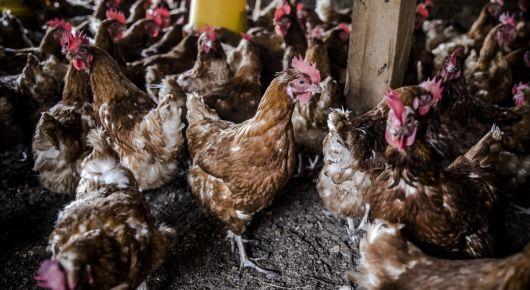FAO projects and tools target antimicrobial resistance awareness and reduction

It was a sunny morning, and the farmer stepped out of his house to visit his 3 000 hens. Astonished, he found many of his animals dead, others were laying down showing breathing difficulties. Scared and desperate, he instantly started collecting the bird carcases while thinking of what he should do. As the last time he got sick, the doctor prescribed him antibiotics, so he decided to add a significant amount of antibiotics to the drinking water of the birds – double the recommended dose, “just to be on the safe side.”
Early on the following day, the farmer rushed into the chicken house, but more birds had died. Puzzled, he called the local veterinarian. When the doctor arrived, the loss was even greater. After listening to the farmer’s explanation and examining dead and sick birds, the vet wanted to talk.
“Your animals suffer either from a viral disease – and no matter how much antibiotics you pour into the water, the birds will not be cured, as antibiotics, hence their name, affect only bacteria and not viruses – or,” continued the expert, “the bacteria has developed resistance to the drug you have used.”
When seeing the farmer’s surprised face, the veterinarian explained that resistance in the bacteria, called antimicrobial resistance, happens when the bacteria goes through a change in a way that makes antibiotics ineffective against it, thus making the antibiotics unable to harm the disease that results.
Answering the farmer’s question on how to avoid it, the veterinarian advised, “Good husbandry practices that will minimize the occurrence of diseases will help fight against this resistance. Also, using antimicrobials according to veterinarian instructions will help reduce it.”
Antimicrobial resistance is a growing global trend, threatening health, food security, and development because of antimicrobial misuse. World Antibiotics Awareness Week (18–24 November) is an opportunity to strengthen our commitment against this issue.
Prudent use of antimicrobials is essential for limiting the development of resistant “superbugs.” However, actions targeted at avoiding their dissemination are equally necessary to reduce risks. These actions include improved hygiene and good health services, such as vaccination for humans and animals.
Since identifying antimicrobial resistance as a priority health issue in 2016, the United Nations has been promoting more prudent use of antimicrobials through a multi-sector approach, called One Health. FAO, the World Organisation for Animal Health, and the World Health Organization are coordinating this work.
In the light of this joint approach, FAO developed the Progressive Management Pathway for antimicrobial resistance to help the food and agriculture production sectors – public or private – develop and implement national action plans on the optimal and sustainable use of antimicrobials.
Additionally, FAO’s Assessment Tool for Laboratories and Antimicrobial Resistance Surveillance Systems (ATLASS) makes it easier for countries to assess and improve their national surveillance systems. With quicker and more accurate diagnostics it becomes easier to define the right antimicrobials and treat infection without dangerous errors. The tool has already been introduced in the Russian Federation.
“A Russia-supported FAO project in Armenia, Belarus, Kazakhstan, Kyrgyzstan, and Tajikistan targets national authorities, farmers, and animal and human health professionals to let them better handle threats posed by resistant microbes in agriculture and food systems,” noted Eran Raizman, FAO senior livestock expert.
Ultimately, these efforts should reach farmers, like the one in the case described above, to make them realize the importance of prevention, such as vaccinations, and good husbandry practices, such as hygiene and biosecurity, over trying to reduce losses when a disease has already kicked in.
20 November 2019, Budapest, Hungary
